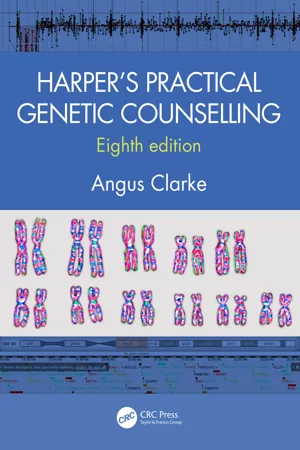
- 532 pages
- English
- ePUB (mobile friendly)
- Available on iOS & Android
Harper's Practical Genetic Counselling, Eighth Edition
About this book
Highly valued across the world by genetic counsellors, medical geneticists and other healthcare professionals, Harper's Practical Genetic Counselling has established itself over previous editions as the essential guide to counselling those at risk from inherited disorders.
Fully revised by its new author Angus Clarke, and with additional input from colleagues, this eighth edition provides indispensable and up-to-date guidance, helping readers to navigate the profusion of new information in this area and the associated psychosocial and ethical considerations and concerns. Maintaining the trusted framework of earlier editions, the update presents the latest information on the use and interpretation of genetic test results, including new genomebased investigations and their application in the genetic counselling process. This book will help both the student and the practitioner, as genetic and genomic investigations become progressively more relevant to all healthcare professionals with the mainstreaming of genetics across the full range of medical practice.
The eighth edition of this best-selling text will continue to be an essential source of reference for trainee and practitioner genetic counsellors and medical geneticists, for clinicians and nurses working in mainstream specialties who increasingly are dealing with the genetic aspects of disease, and for practitioners working in settings where referral to a genetics specialist is not readily available. It also provides invaluable background for other healthcare professionals, counsellors, social scientists, ethicists and genetics laboratory staff.
Tools to learn more effectively

Saving Books

Keyword Search

Annotating Text

Listen to it instead
Information
Table of contents
- Cover
- Half Title
- Frontispiece
- Title Page
- Copyright Page
- Contents
- Preface to Eighth Edition
- Acknowledgements
- Part 1: General aspects of genetics and genetic counselling
- Part 2: Genetic counselling: Specific organ systems
- Part 3: Genetic counselling and testing for cancer
- Part 4: Genetic counselling in context: The broader picture
- Glossary
- Appendix 1: Further Reading and Information
- Appendix 2: Practical Genetic Counselling – The life story of a book
- Index
Frequently asked questions
- Essential is ideal for learners and professionals who enjoy exploring a wide range of subjects. Access the Essential Library with 800,000+ trusted titles and best-sellers across business, personal growth, and the humanities. Includes unlimited reading time and Standard Read Aloud voice.
- Complete: Perfect for advanced learners and researchers needing full, unrestricted access. Unlock 1.4M+ books across hundreds of subjects, including academic and specialized titles. The Complete Plan also includes advanced features like Premium Read Aloud and Research Assistant.
Please note we cannot support devices running on iOS 13 and Android 7 or earlier. Learn more about using the app